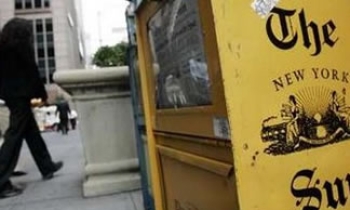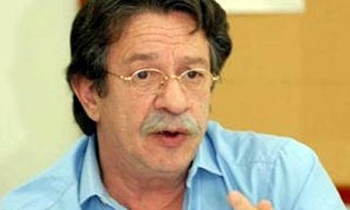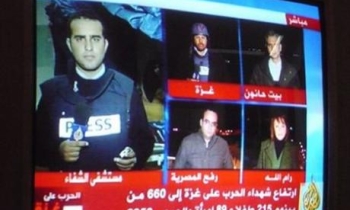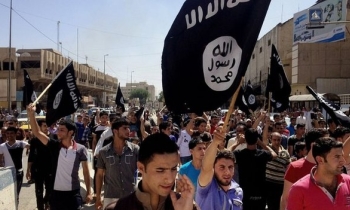LONDON: Vaughan Smith leaned forward in his chair and winced as a scene from "Baghdad E.R.," a documentary film about an American army hospital in Iraq, rolled across the screen. "It's pretty gory," he said as the camera zoomed in on a soldier's eye, from which a surgeon was about to remove a bit of shrapnel.
While some people look away from the effects of war, Smith prefers to examine them closely. A former officer with the Queen's Guards, an elite British military unit, he went on to become a founder of Frontline Television News, a group of British cameramen who gained a reputation for taking extraordinary risks to bring back footage from Afghanistan, Iraq, the Balkans and other war zones.
As the market for freelance TV footage dried up a few years ago and after the deaths of two of the three other founders of the agency, Smith set up the Frontline Club in London. Since its opening in 2003, the club and restaurant has become a popular way station for war correspondents. It has also become a busy forum for screenings of films like "Baghdad E.R." and discussions of current affairs and journalism issues, including the safety of reporters working in danger zones.
"We saw friends get killed in the course of their work," said Smith, 43, who was shot twice himself while covering the Balkan wars. "We thought their work was undervalued and wanted to stimulate debate about the role of journalists."
That makes the Frontline Club very different from the London clubs of legend, where gentlemen sip port in the company of like-minded souls. Such establishments have largely faded, and London clubs frequented by journalists have also evolved.
The Wig & Pen Club, a watering hole where lawyers and reporters mingled in the glory days of Fleet Street, closed in 2003. By the 1980s, journalists had gravitated toward the Groucho Club, which developed a notorious reputation for the number of drinks and scoops that were spilled within. In the 1990s, some media types peeled away to Soho House, which has since opened a New York outpost as well.
But while the denizens of these drinking dens tend to whisper about the latest affairs between members of Parliament and tabloid reporters, or scraps of gossip from Hollywood, the Frontline Club is definitely the place to go to eavesdrop on a conversation about, say, the political situation in Kyrgyzstan.
While the club's bar is reserved for members, who chat in English, French or Arabic, work on laptops or sip Laotian beer, there is also a Frontline restaurant, where the public can dine on Welsh mountain lamb rump or line-caught plaice against a backdrop of photos of London during the Blitz.
In a small auditorium upstairs, the Frontline Forum, supported by proceeds from the restaurant and a charitable trust, organizes film screenings, book introductions and panel discussions on current events and journalism issues.
In September, for example, the forum plans a discussion of coverage of the conflict in Lebanon, focusing on the difficulties that journalists face in sorting out fact from spin at a time when both Hezbollah and Israel, and their supporters, are getting better at the propaganda war. Among others, it will include Middle East reporters like Marie Colvin of The Sunday Times of London and Paul Eedle, a former Reuters reporter who is an expert on Islamic Web sites.
"A lot of people won't talk about these things, but we think it's better to air them, in a neutral way," Smith said.
So while the forum has played host to executives of Al Jazeera, the satellite broadcaster based in Qatar that is loathed by the Bush administration, it has also screened a documentary that casts doubt on allegations of a massacre at Jenin on the West Bank by the Israel Defense Forces in 2002.
The Frontline Club has about 850 members, who pay annual fees of £250, or $475, though freelancers receive discounts. About 70 percent of the members are in the media business, including London-based and international correspondents from around the world.
While mementos from former Frontline agency cameramen killed in the line of duty are displayed in glass cases, Smith insisted that the club did not seek to capitalize on glamour in war reporting.
"Yes it's sexy and I see the appeal," he said. "But we're serving a community and meeting a need, not using that community."
Smith set up Frontline by borrowing £3 million against his family's estate in Norfolk, England, and has received funding for its events from the Open Society Institute, a philanthropic organization set up by the billionaire George Soros. Though Frontline has yet to break even, Smith is talking about expanding, weighing the possibility of opening a club in New York or Washington, perhaps with a local business partner.
More definite is a move into Russia, where Frontline plans to start a series of events this autumn, in partnership with local organizations promoting press freedom, like the Center for Journalism in Extreme Situations and Internews Russia. They will include events similar to those run by the Frontline Forum in London and will be staged at universities, cafés and cultural centers in Moscow and other cities.
Frontline Russia will also organize discussions on more locally relevant issues, organizers say.
Press freedom has become a sensitive issue in Russia as the government of President Vladimir Putin has expanded its influence over the media and curbed the activities of nongovernmental organizations.
"It is important because modern Russian journalism is only starting to be formed," Oleg Panfilov, director of the Center for Journalism in Extreme Situations, said in an e-mail message from Moscow.
While Smith keeps busy for now managing the restaurant and club, leading discussions and tending to what he refers to as the "family farm," he said he missed going into the field. He is thinking about ways to use Frontline's Web site as a vehicle to distribute independent journalism, including things like blogs or video footage from television freelancers.
And, while running a restaurant is surely a safer way to make a living than dodging bullets in Lebanon or Iraq, it creates headaches of a different sort.
"From news cameraman to restaurateur is quite a learning curve," Smith said. "One thing I have learned is how motivated people are in journalism."









